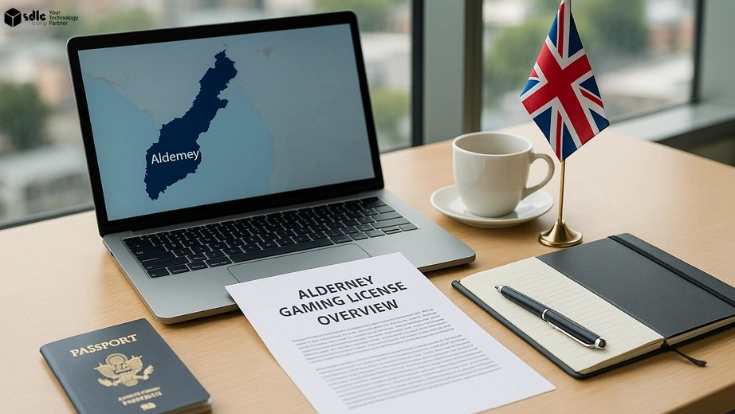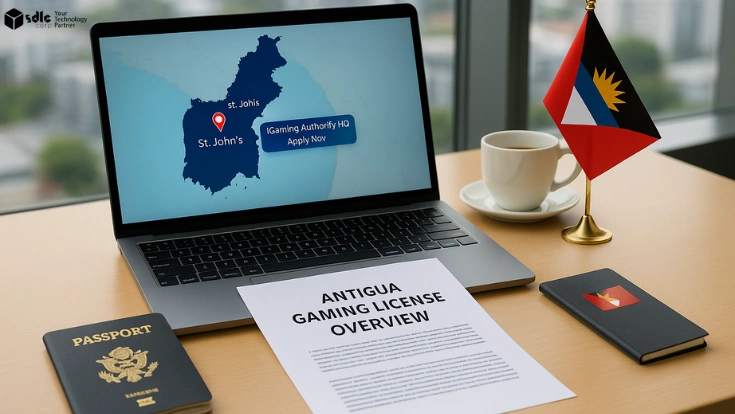Introduction
Securing a gambling license is the core step in launching a legal, reputable online casino app, as it proves regulatory compliance, strengthens player trust, and opens access to major global markets. With the online gambling industry projected to surpass $127 billion by 2027, understanding how licensing works has become essential for entrepreneurs, investors, and iGaming developers. This guide walks you through selecting the right jurisdiction, preparing your application, and meeting all legal requirements so you can operate confidently and competitively on an international scale.
How to Secure a Gambling License for Online Casino Apps
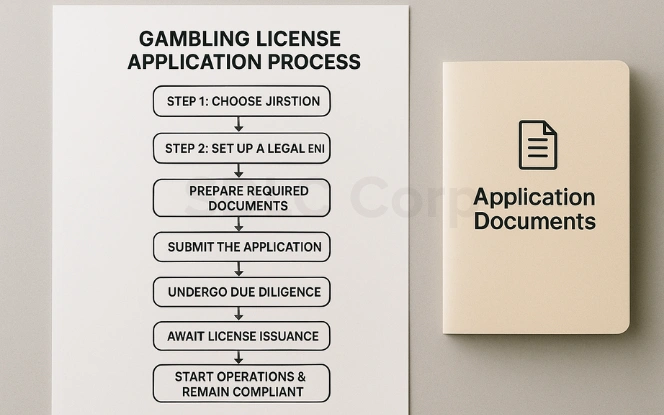
The licensing process can feel complex, especially with international laws in play. Here’s a simplified step-by-step breakdown of how to secure a gambling license for your casino app:
Step 1: Choose the Right Jurisdiction
Compare costs, taxes, approval time, and regulatory strictness.
Select a jurisdiction that aligns with your target markets and business model.
Step 2: Set Up a Legal Entity
- Register your company in the jurisdiction where you plan to apply.
- Ensure the entity meets local requirements for ownership and management.
Step 3: Prepare Required Documents
Collect business details, financial statements, and shareholder IDs.
Prepare technical documents like RNG certification and compliance policies.
Step 4: Submit the Application
- Upload all documents through the regulator’s online portal.
- Pay the required application and assessment fees.
Step 5: Undergo Due Diligence
- Regulators will verify company directors, finances, and operational plans.
- Additional interviews or clarification requests may be issued.
Step 6: Await License Issuance
- Regulators finalize reviews before granting approval.
- Upon approval, the gambling license is issued for a set term (1–5 years).
Step 7: Start Operations & Remain Compliant
- Maintain ongoing reporting, audits, and AML/KYC compliance.
- Update systems and certifications to meet regulatory standards.
Also Read: Online Casino Game Monetization Strategies
Key Gambling Regulatory Bodies Worldwide
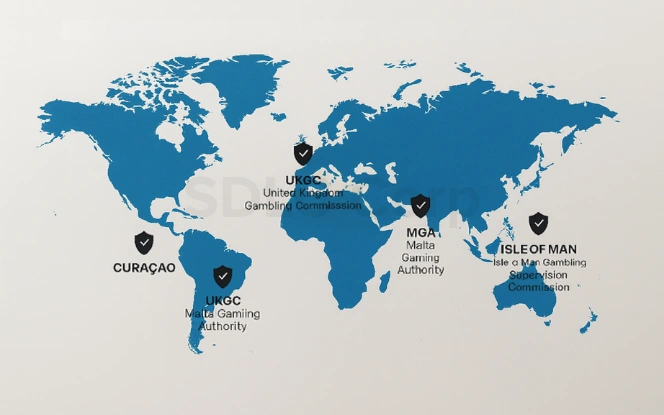
Every country or region has its own gambling regulatory body, with varying standards and procedures. Here are some of the most reputable gambling license jurisdictions for online casinos:
Top Licensing Authorities:
Each of these casino licensing countries has its own pros and cons. For instance, Curaçao is often favored by startups due to its lower costs and faster processing, whereas Malta and the UK are more stringent but offer better access to European markets.
Choosing the Right Jurisdiction for Licensing
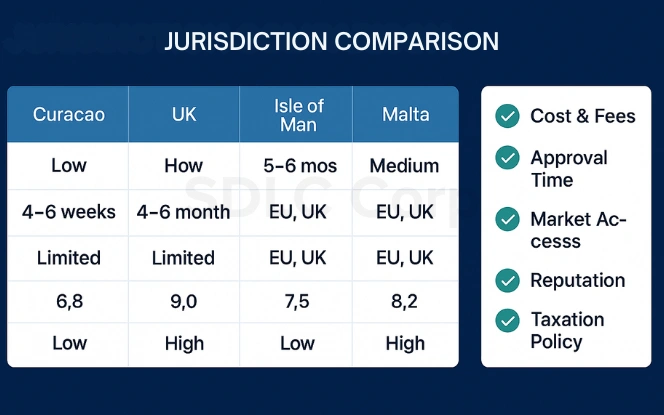
Selecting the right jurisdiction is one of the most critical decisions you’ll make when applying for an online gambling license. This choice impacts everything from tax rates to operational scalability.
Factors to Consider:
Cost and Fees: Upfront license fees, renewal fees, and compliance costs.
Approval Time: Some licenses take 4–6 weeks (Curaçao), others up to 6 months (UK).
Market Access: Certain jurisdictions offer access to restricted regions (e.g., EU or UK).
Reputation: Trust factor among players and financial institutions.
Taxation Policy: Tax-friendly zones like Isle of Man help improve ROI.
Gambling License Requirements for Casino Apps
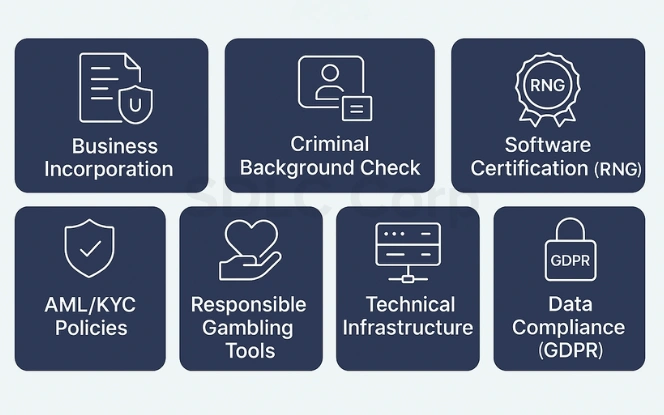
To qualify for a license, your online casino app must meet specific legal, financial, and technical requirements laid out by the issuing jurisdiction.
Typical Requirements Include:
Business Incorporation: Proof of a legally registered business entity in the licensing jurisdiction.
Criminal Background Check: For all major stakeholders.
Software Certification: Games must be certified by independent labs for fair play and RNG (Random Number Generator) compliance.
Anti-Money Laundering (AML) Policies: Mandatory KYC (Know Your Customer) and AML protocols.
Responsible Gambling Measures: Deposit limits, self-exclusion tools, and user safety features.
Technical Infrastructure: Secure server hosting, encrypted data handling, and regional geo-blocking.
Compliance with Data Laws: Adherence to GDPR and other data privacy regulations.
Meeting these online gambling license requirements is essential not only to obtain the license but also to maintain it long-term. Understanding the gambling license process for online casino apps helps operators stay compliant and build long-term player trust.
Cost to Secure a Gambling License Globally
| Component | Cost | Notes |
|---|---|---|
| Application Fee | $10,000 – $60,000 | One-time submission cost |
| License Fee (Year 1) | $15,000 – $70,000 | Initial regulatory fee |
| Annual Renewal | $10,000 – $50,000 | Yearly license renewal |
| Technical & RNG Testing | $3,000 – $15,000 | Fairness and system audits |
| Compliance Setup | $5,000 – $25,000 | KYC/AML implementation |
| Legal Support | $8,000 – $30,000 | Documentation and filings |
The gambling license cost varies widely depending on the jurisdiction and the scale of your operation.
Breakdown of Typical Costs:
Other potential expenses include:
Server infrastructure
RNG and game fairness testing
Legal consultation
Internal compliance officers
Always allocate a buffer budget for unforeseen online gaming compliance requirements.
Common Mistakes to Avoid During the Licensing Process
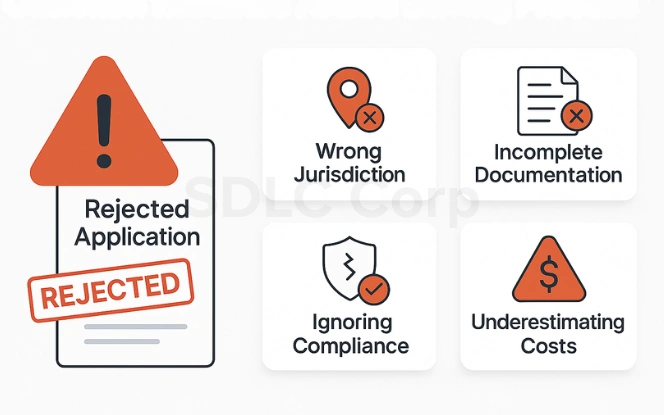
Even experienced operators can falter during the gambling license application process. Here are some pitfalls to watch for:
Choosing the Wrong Jurisdiction: Misalignment with your target market can limit growth.
Incomplete Documentation: Missing or outdated paperwork can delay approvals.
Ignoring Compliance: Failure to integrate KYC/AML measures can result in license suspension.
Underestimating Costs: Budget overruns from hidden compliance or legal costs.
Avoiding these mistakes will smooth the process and improve your chance of getting licensed quickly and efficiently.
Post-Licensing Compliance and Maintenance
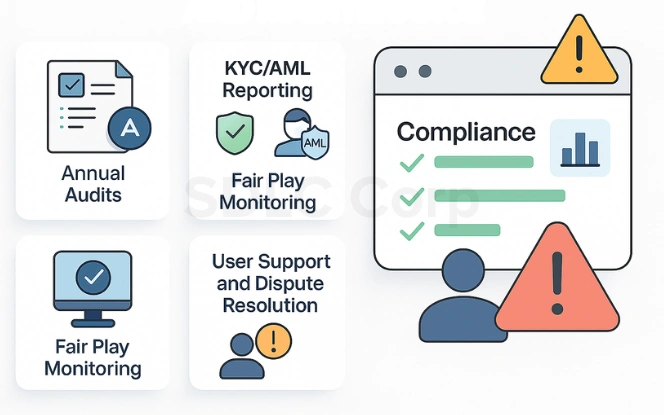
Securing a license is just the beginning. Most gambling regulatory bodies require continuous compliance checks.
Ongoing Obligations Include:
Annual Audits: Financial and technical evaluations.
KYC/AML Reporting: Regular reports on suspicious transactions.
Fair Play Monitoring: Re-certification of RNG algorithms.
User Support and Dispute Resolution: Ensuring legal and ethical treatment of players.
Non-compliance may result in penalties, reputation damage, or even revocation of your online casino license.
Conclusion
In today’s competitive iGaming market, a valid gambling license for online casino apps is essential for legal compliance, player trust, and global growth. From selecting the right jurisdiction to meeting compliance standards, every step is critical to launching a successful and scalable platform.
As a top casino game development company, SDLC Corp helps streamline the licensing process while building high-performance, compliant casino apps.
FAQ's
Do I need a gambling license to launch a free-play casino app?
No, as long as there’s no real money involved or prizes of value, most jurisdictions don’t require a license for free-play apps.
What's the cheapest gambling license available?
The Curacao gambling license is generally the most affordable and fastest to obtain.
Can I accept players from any country with one license?
No. Some countries have their own rules, and even with a license, geo-blocking may be necessary (e.g., the US, France).
What is KYC, and why is it important?
KYC (Know Your Customer) is a mandatory process for verifying the identity of your players to prevent fraud and money laundering.
Is it legal to operate an online casino without a license?
No. Operating without a gambling license for online casino apps is illegal and can result in heavy penalties.
Can SDLC CORP handle end-to-end development?
Yes, SDLC CORP handles end-to-end development, from concept to deployment. They cover design, coding, testing, and post-launch support for complete project delivery.


